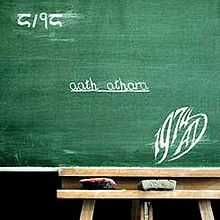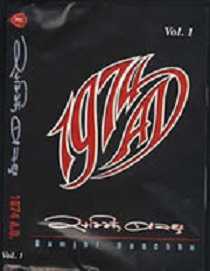1974 AD
| 1974 AD | |
|---|---|
 | |
| Background information | |
| Also known as | 1974 |
| Origin | Kathmandu, Nepal |
| Genres | Blues-rock, rock and roll, folk, ragas, funk, blues, jazz |
| Years active | 1994 — present |
| Website | http://www.1974ad.com.np/ |
| Members |
Adrian Pradhan — Vocals & Drums Phiroj Shyangden — Vocals & Guitars Nirakar Yakthumba — Bass Manoj Kumar KC — Guitar, Keyboards Sanjay Shrestha — Percussions Manose Singh- Flute |
| Past members | Bhanu A — Guitar & Drums[1] |
1974 AD is a Nepali rock band, formed in Kathmandu, Nepal in the early 90s. They experiment with various genre of music including Nepali folk, ragas, rock, funk, blues and jazz as well. 1974 AD are amongst the most successful recording artists in Nepal. Most of their albums are ranked among the top-ten best-selling albums according to the Hits FM of Nepal. Their concert name being 'Rock Yatra,' in 2000 AD was watched by more than 60,000 people, the largest attendance for a concert in Nepal.
Songs and albums produced by 1974 AD are usually in the Nepali language. Lyrics include themes of patriotism, Nepali virtues, unity, love and nationalism. There is a lot of variety in the music of 1974 AD. They have successfully tried various genres of music. Their songs, like "Nepali," "Sambodhan," "Pahilo Junima," "Parelima," "Samjhi Baschu" and "Chudaina Timro Mayale" amongst various others, were some of the biggest hits in Nepalese music. The song "Nepali" from their highest selling album Satabdi has been received as the most patriotic songs till now.
Formation 1994
The group was formed during the 90s era by a group of teachers from Gyanodaya School in Lalitpur. The founding members included guitarist Phiroj Shyangden, bassist Nirakar Yakthumba, drummer Bhanu A. During the early days the band used to play various genres including hard rock, heavy metal, rock and blues. Drummer Bhanu A was very much into blues music. Whenever they played cover tunes he was the one singing Gary Moore numbers like "Walking by Myself". They played several gigs around Kathmandu where they used to cover numbers from Bryan Adams, Deep Purple and other rock groups. Phiroj Shyangden is one of the best guitarists in Nepali rock scene. He is a good shredder too and his bluesy rock style has inspired many guitarist in Nepal. He is an excellent guitarist talented in tapping and playing high paced solo with clean tone and perfection. His style has the flavour of guitar greats like Gary Moore, Ritchie Blackmore of Deep purple and Eddie Van Halen. They mainly performed self compositions. Their hit tune is "Mayaluleh" from their debut album "Time Out", a song which would establish them as a household name in the Nepali music scenario. That time, the would be band members Adrian Pradhan and Sanjay Shreshta were involved in their own bands. Adrian used to be in a hard rock band from Kalimpong named "The Flame".
"The Flame" held their first concert in Dasharath Stadium in Kathmandu during the winter of 1994. They were basically a cover band doing songs from Iron maiden, Metallica, Extreme and other rock acts. Adrian Pradhan used to play the rhythm guitar and do the vocal dutiess. The influence of the early heavy metal vocalling can be heard in Adrian's singing style. Later during the late 90s Adrian joined 1974 AD as their drummer/vocalist after former drummer Bhanu A went on a hiatus. Percussionist Sanjay Shrestha, who used to play the drums for the St Xaviers school band, was involved with Nepali fusion rock act Shristi.
Flute maestro Manose Singh would soon join 1974 AD and enjoy the popularity of the highly successful band and also contribute to the diversity of sound in the band. Later on during the late 90s local guitar enthusiast Manoj K.C from Dhobighat, Lalitpur would join 1974 AD and complete the lineup. Together they would form a rock solid act and go on to conquer the hearts of millions of die hard Nepali fans of Nepal.
Fame and fortune
.jpg)
The band was very popular in the Kathmandu and Lalitpur rock scene in mid 90s even before they started churning out big hits like "Mayalule" and other tunes. But the release of their debut album established them as a household name in Nepali music. Their compositions which includes lyrics on patriotism, self pride as a Nepali and love and unity amongst Nepali people are big hits in Nepali pop culture. They have come up with songs that has helped the nation unite and express the mutual feelings at times of big changes in country as in the form of political and other big events. The songs can be melodic but at the same time very dark with the lyrics and message it carries. The music covers various genres like heavy metal, hard rock, blues, reggae and funk/soul.
Post Phiroj 1974AD (2008 - 2012)
While Manose Singh continues to contribute to the bands newer compositions, given his other musical commitment, Phiroj Shyangden has now exited the band for personal reasons. Not surprisingly, many fans feel a loss, some more than others, in the sound and image of the band. But the band, now with Adrian on vocals and Sanjay on drums, continues to find newer sound. Their new album 8:18 (aath:athara) has been received well by the audience. Numbers like Timi Bina, Bardaan and Rain Song from the album emerged to become winner. However, exit of Phiroj Shyangnden, one of the key members of the band and also the most influential guitarist in Nepal was something that severely hit the band's latest album.
Back with Phiroj 1974AD (2012 - Present)
During their historic US tour of 2012, the band reunited with Phiroj for a few songs in their New York concert on April 21, 2012. After the successful reunion and with the help of the organizer, Karma Tenzing the band decided to collaborate again for their next show in Baltimore, scheduled 2 weeks after. Band members Nirakar and Sanjay stated in Nepali that Phiroj had "never left 1974 AD to begin with. He always was and still is a part of them". They confirmed to various media outlets that the band had reunited again. In the winter of 2012, Phiroj returned to Nepal and performed in more concerts at St. Xavier's and in various Nepalese cities with the band. The band even recorded a few songs for their next album. Phiroj is now back in New York and according to him, the album release would coincide with the band's 20th anniversary in 2014.
Awards
- Hits FM Music Award 2000
- Best performance by group or duo with vocal
- Sanmiguel Music Award 2000
- Best performance by group or duo with vocal
- Hits FM Music Award 2002
- Best performance by group or duo with vocal
- Hits FM Music Award 2004
- Best performance by group or duo with vocal
- Image Award 2004
- Best song with National feelings
- Hits FM Music Award 2005
- Best performance by group or duo with vocal
- Image Award 2005
- Best Rock song
- Kantipur FM Annual Award 2001,2002,2003 & 2004
- Most air played song
Discography
Aath Athara
| Aath Athara | |
|---|---|
 | |
| Studio album by 1974 A D | |
| Released | 2010 |
| Genre | POP |
| Label | Music Nepal |
| Tracklist | ||||||||||
|---|---|---|---|---|---|---|---|---|---|---|
| No. | Title | Length | ||||||||
| 1. | "Timi Bina" | 5:14 | ||||||||
| 2. | "Yaha" | 3:58 | ||||||||
| 3. | "Aaja Kaha" | 4:28 | ||||||||
| 4. | "Bardaan" | 5:27 | ||||||||
| 5. | "Ma Ko Hoon" | 5:37 | ||||||||
| 6. | "Rain Song" | 3:39 | ||||||||
| 7. | "Chu Tadha" | 4:32 | ||||||||
| 8. | "Bijayee Hau" | 4:42 | ||||||||
Time Out
| Time Out | |
|---|---|
 | |
| Studio album by 1974 A D | |
| Released | 1996 |
| Genre | POP |
| Label | Music Nepal |
| Tracklist | ||||||||||
|---|---|---|---|---|---|---|---|---|---|---|
| No. | Title | Length | ||||||||
| 1. | "Mayalule" | 4:20 | ||||||||
| 2. | "Timro Samjhana" | 5:43 | ||||||||
| 3. | "G F Blues" | 4:27 | ||||||||
| 4. | "Pot of Gold" | |||||||||
| 5. | "Hey!U'" | |||||||||
| 6. | "Nowhere to go" | |||||||||
Samjhi Baschu
| Samjhi Baschu | |
|---|---|
 | |
| Studio album by 1974 A D | |
| Released | 1998 |
| Genre | POP |
| Label | Music Nepal |
| Tracklist | ||||||||||
|---|---|---|---|---|---|---|---|---|---|---|
| No. | Title | Length | ||||||||
| 1. | "Chaubandi choli" | 4:13 | ||||||||
| 2. | "Samjhi Baschu" | 5:30 | ||||||||
| 3. | "Eklo Chhu" | 3:56 | ||||||||
| 4. | "Chhadain chha" | 3:43 | ||||||||
| 5. | "Mayalule" | 4:20 | ||||||||
| 6. | "Sixteen Bar Blues" | 5:14 | ||||||||
| 7. | "Deurali Bhanjyang" | 5:06 | ||||||||
| 8. | "Timilai Piratile" | 5:16 | ||||||||
| 9. | "Jati Maya" | 5:09 | ||||||||
| 10. | "Parelima" | 3:52 | ||||||||
External links
Notes
- ↑ "1974 AD :: The Official Website". Archived from the original on 2009-05-30. Retrieved 2009-05-28.